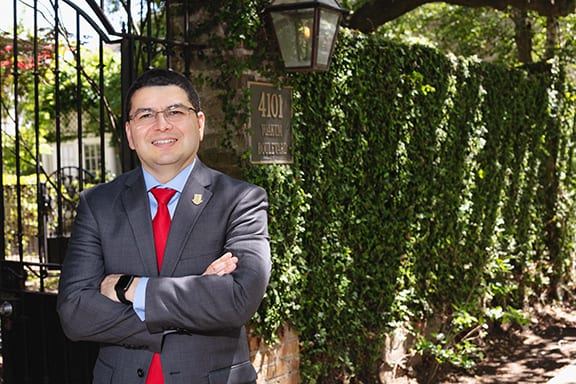Q & A: The Future of Enrollment
 By 2023, UST intends to double enrollment. Where does admissions stand with The Call Toward Tomorrow goals?
By 2023, UST intends to double enrollment. Where does admissions stand with The Call Toward Tomorrow goals?
We have steadily increased undergraduate enrollment. Last fall, we had the largest undergraduate enrollment in UST history. We believe it is possible to double enrollment by 2023 because we are in a vibrant and growing city; we are in a tremendous location; and we have a high-quality education and college experience that students want to be part of.
Are there any plans in infrastructure that will contribute to the large growth of enrollment?
When an institution grows in its enrollment, certainly the infrastructure is impacted. With this in mind, UST will expand its infrastructure to ensure students have the best college experience. We plan to add additional residence halls, creating a greater community feel. With that, there is a need for more spaces for students to study, socialize and engage in activities. UST has already embarked on a master plan initiative. The master plan has identified areas in the order of growth that we need to stay up to date, but more importantly, to help our students succeed. The expansion into Conroe will also have a significant impact on enrollment.
What trends are you noticing in higher education admissions?
The fastest trend right now is a number of schools going to a test-optional admissions policy. UST will join in when it announces a test-optional admissions policy this summer. This means that applying students will declare whether they want to apply in a standard manner, or if they would like their application reviewed without standardized tests. Other requirements will need to be met by those students such as an additional writing sample, or an interview with a counselor. This continues a UST tradition to holistically review candidates who apply, not just looking at one piece of criteria. Most of the top 100 liberal arts colleges and universities in the country now employ some form of a test-optional policy, and the data has shown that students persist and graduate. The best predictor of college success is a student’s high school GPA, not standardized test scores. We intend to enroll students based on performance, not because they have the ability to test well.
The recent college admissions scandal: What was the impact?
I want to point out this is a unique situation and no admissions personnel at the implicated universities were participants. The actions of test proctors changing answers or consultants falsifying sports records for a student to gain admission as an athlete is outside the purview of an admission counselor. This scandal involved a very intricate network of people positioned at many levels who intentionally perpetrated fraud in a designed way. Nevertheless, it cannot be denied that in these instances, it required families with the financial means to influence and even direct decisions at the institutions in question to pull off this criminal activity.
This type of scandal also highlights the disadvantages that often impact students from lower socioeconomic backgrounds. In a sense, it also affects middle class families. Students who do not come from wealthy backgrounds often attend high schools that do not have the resources to provide the same quality college entrance exam test preparation. Many overcome some of these disadvantages, but it adds insult to injury when there are others from wealthier families who may not meet admissions criteria but gain admissions to the college of choice because of fraud. I want to emphasize that while this is receiving a great deal of attention, it is not a common issue, and it is a mistake to assume this happens all the time.
How would this affect the UST Code of Ethics?
Most admissions leaders are upset because this is a college admissions scandal, although admissions offices are not involved in these cases. Admissions counselors have a governing organization, National Association for Admissions Counseling, which provides all members a “Code of Ethics and Professional Practices” to ensure professionals maintain high standards of integrity. At UST we take these principles seriously.
We do not engage in discussions or accept gifts that would undermine our admissions policy or Code of Ethics. Once a student has met all the qualifications, UST’s admissions counselors have the ability to make the decision. If a student does not meet all requirements, we have a policy for a committee review. University of St. Thomas is poised to grow rapidly over the coming years. But, we will do it through quality programs and with high ethical standards.